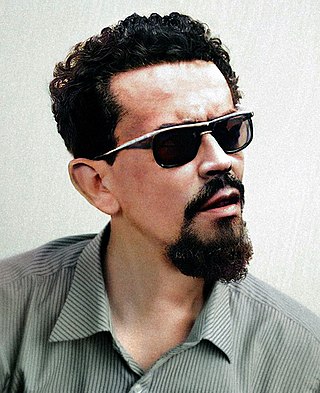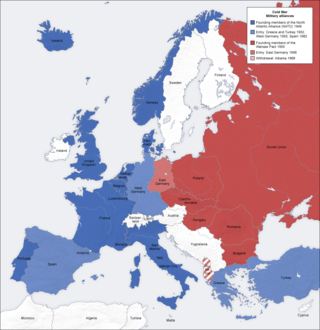
Osama bin Mohammed bin Awad bin Laden was a Saudi-born militant who was the founder and first general emir of al-Qaeda from 1988 until his death. Ideologically a pan-Islamist, his group is designated as a terrorist group by the United Nations Security Council, the North Atlantic Treaty Organization (NATO), the European Union, and various other countries.

The Soviet–Afghan War was a protracted armed conflict fought in the Soviet-controlled Democratic Republic of Afghanistan (DRA) from 1979 to 1989. The war was a major conflict of the Cold War as it saw extensive fighting between the DRA, the Soviet Union and allied paramilitary groups against the Afghan mujahideen and their allied foreign fighters. While the mujahideen were backed by various countries and organizations, the majority of their support came from Pakistan, the United States, the United Kingdom, China, Iran, and the Arab states of the Persian Gulf. The involvement of the foreign powers made the war a proxy war between the United States and the Soviet Union. Combat took place throughout the 1980s, mostly in the Afghan countryside. The conflict led to the deaths of between 562,000 and 2,000,000 Afghans, while millions more fled from the country as refugees; most externally displaced Afghans sought refuge in Pakistan and in Iran. Approximately 6.5% to 11.5% of Afghanistan's erstwhile population of 13.5 million people is estimated to have been killed over the course of the conflict. The Soviet–Afghan War caused grave destruction throughout Afghanistan and has also been cited by scholars as a significant factor that contributed to the dissolution of the Soviet Union, formally ending the Cold War.

Sheikh Omar Abdel-Rahman, , commonly known in the United States as "The Blind Sheikh", was a blind Egyptian Islamist militant who served a life sentence at the Federal Medical Center, Butner near Butner, North Carolina, United States. Formerly a resident of New York City, Abdel-Rahman and nine others were convicted of seditious conspiracy in 1995. His prosecution grew out of investigations of the 1993 World Trade Center bombing.

Vasili Nikitich Mitrokhin was a major and senior archivist for the Soviet Union's foreign intelligence service, the First Chief Directorate of the KGB, who defected to the United Kingdom in 1992 after providing the British embassy in Riga with a vast collection of his notes purporting to be written copies of KGB files. These became known as the Mitrokhin Archives. The intelligence files given by Mitrokhin to the MI6 exposed an unknown number of Soviet agents, including Melita Norwood.

Active measures is a term used to describe political warfare conducted by the Soviet Union and the Russian Federation. The term, which dates back the 1920s, includes operations such as espionage, propaganda, sabotage and assassination, based on foreign policy objectives of the Soviet and Russian governments. Active measures have continued to be used by the administration of Vladimir Putin.

Abdullah Yusuf Azzam was a Palestinian Islamic scholar and jihadist. Belonging to the Salafi movement, during the Soviet–Afghan War of the 1980s, he advocated defensive jihad by Muslims worldwide to help the Afghan mujahideen fight against the Soviet forces and Afghan Government forces in the Democratic Republic of Afghanistan.
John Kent Cooley was an American journalist and author who specialized in islamist groups and the Middle East. Based in Athens, he worked as a radio and off-air television correspondent for ABC News and was a long-time contributing editor to the Christian Science Monitor.

Carlos Fonseca Amador was a Nicaraguan teacher, librarian and revolutionary who founded the Sandinista National Liberation Front (FSLN). Fonseca was later killed in the mountains of the Zelaya Department, Nicaragua, three years before the FSLN took power.

Holy War, Inc.: Inside the Secret World of Bin Laden is a book by CNN investigative journalist and documentarian Peter Bergen. It was published in November 2001, two months after the September 11 attacks, and was a New York Times Best Seller in 2001.

This is an English language bibliography of scholarly books and articles on the Cold War. Because of the extent of the Cold War, the conflict is well documented.

Odd Arne Westad FBA is a Norwegian historian specializing in the Cold War and contemporary East Asian history. He is the Elihu Professor of History and Global Affairs at Yale University, where he teaches in the Yale History Department and in the Jackson School of Global Affairs. Previously, Westad held the S.T. Lee Chair of US-Asia Relations at Harvard University, teaching in the John F. Kennedy School of Government. Westad has also taught at the London School of Economics, where he served as director of LSE IDEAS. In the spring semester 2019 Westad was Boeing Company Chair in International Relations at Schwarzman College, Tsinghua University.
Afghan Arabs are Arab and other Muslim Islamist mujahideen who came to Afghanistan during and following the Soviet–Afghan War to help fellow Muslims fight Soviets and the pro-Soviet Afghans in the DRA Despite being called "Afghan" they were not from Afghanistan nor legally citizens of Afghanistan.

Operation Cyclone was the code name for the United States Central Intelligence Agency (CIA) program to arm and finance the Afghan mujahideen in Afghanistan from 1979 to 1992, prior to and during the military intervention by the USSR in support of the Democratic Republic of Afghanistan. The mujahideen were also supported by Britain's MI6, who conducted their own separate covert actions. The program leaned heavily towards supporting militant Islamic groups, including groups with jihadist ties, that were favored by the regime of Muhammad Zia-ul-Haq in neighboring Pakistan, rather than other, less ideological Afghan resistance groups that had also been fighting the Soviet-oriented Democratic Republic of Afghanistan administration since before the Soviet intervention.
The Battle of Jaji was fought during the Soviet–Afghan War between Soviet Army units, and their allies of the Democratic Republic of Afghanistan against Maktab al-Khidamat in Paktia Province. This battle occurred in May 1987, during the first stage of withdrawal of Soviet forces from Afghanistan. The objective was to relieve a besieged garrison at Ali Sher, and cut off supply lines to the Mujahideen from Pakistan. The battle is primarily known for the participation of the Arab foreign fighter and future founder of Al Qaeda, Osama bin Laden, who acquired his reputation as a divine jihadist warrior as a result of the Mujahideen victory during this battle. Bin Laden led a group of some 50 Arab foreign fighters during this battle, of which at least 13 were killed in action.

Jamaat al-Dawah ila al-Quran wal-Sunnah, abbreviated as JDQS, also known as The Salafi Group, is a militant Islamist organisation operating in eastern Afghanistan.
The Safari Club was a covert alliance of intelligence services formed in 1976 that ran clandestine operations around Africa at a time when the United States Congress had limited the power of the CIA after years of abuses and when Portugal was dismantling its colonial empire in Africa. Its formal members were the pre-revolution (Pahlavi) Iran, Egypt, Saudi Arabia, Morocco and France. The group maintained informal connections with the United States, South Africa, Rhodesia and Israel. The group executed a successful military intervention in Zaire in response to an invasion from Angola. It also provided arms to Somalia in its 1977–1978 conflict with Ethiopia. It organized secret diplomacy relating to anti-Communism in Africa, and has been credited with initiating the process resulting in the 1979 Egypt–Israel peace treaty.

Several sources have alleged that the Central Intelligence Agency (CIA) had ties with Osama bin Laden's faction of "Afghan Arab" fighters when it armed Mujahideen groups to fight the Soviet Union during the Soviet–Afghan War.
An arms-reduction mission run by the American Central Intelligence Agency, Operation MIAS was tasked with buying back Stinger missiles given to the Mujahideen to fight the Soviet invasion of Afghanistan. Information about the program remains classified, although information has been gleaned from media accounts and government officials speaking off the record.
Keenie Meenie Services, was a British private military contractor set up by former Special Air Service (SAS) officers in 1975. It operated as a mercenary force in countries where the United Kingdom had political interests, such as Oman, Uganda, Afghanistan and Sri Lanka.













